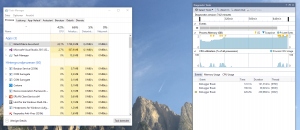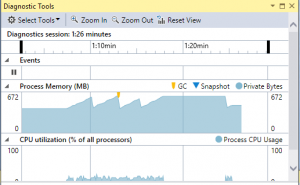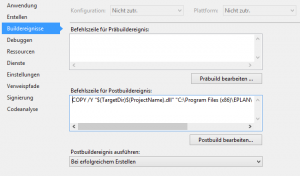Alles rund um die API in EPLAN
EPLAN API: Preview in WPF
Da es nicht ganz so einfach ist in WPF eine Vorschau im Offline Programm zu implementieren, habe ich das mal in eine Klasse gepackt.
Mir ist aufgefallen dass der Speicher hochläuft und habe hier auf EPLAN getippt… Nach Rücksprache mit dem API-Support wurde mir gesagt dass es nicht der Speicher von EPLAN ist, sondern der Applikation, bzw. WPF.
Ich habe hier mal die Generierung der Bitmap in Verdacht gezogen und siehe da, bekannter Bug.
Hier mal im Vergleich:
Auf GitHub findet ihr auch eine Demo-Applikation dazu.
using System;
using System.Windows;
using System.Windows.Controls;
using System.Windows.Forms;
using System.Windows.Interop;
using System.Windows.Media;
using System.Windows.Media.Imaging;
using Eplan.EplApi.DataModel;
using System.Runtime.InteropServices;
using Eplan.EplApi.DataModel.MasterData;
using Eplan.EplApi.HEServices;
namespace Suplanus.Sepla.Gui
{
public class Preview
{
private readonly Border _border;
private readonly DrawingService _drawingService;
private readonly Project _project;
/// <summary>
/// Init Preview object for WPF
/// </summary>
/// <param name="border"></param>
/// <param name="projectFile"></param>
public Preview(Border border, string projectFile)
{
var projectManager = new ProjectManager();
projectManager.LockProjectByDefault = false;
_project = projectManager.OpenProject(projectFile, ProjectManager.OpenMode.Exclusive);
_drawingService = new DrawingService();
_drawingService.DrawConnections = true;
_border = border;
}
/// <summary>
/// Display a file
/// </summary>
/// <param name="path">Full filename</param>
/// <param name="previewType">Type of file</param>
public void Display(string path, PreviewType previewType)
{
switch (previewType)
{
case PreviewType.WindowMacro:
WindowMacro windowMacro = new WindowMacro();
windowMacro.Open(path, _project);
_drawingService.CreateDisplayList(windowMacro);
DrawEplan();
windowMacro.Dispose();
break;
case PreviewType.SymbolMacro:
SymbolMacro symbolMacro = new SymbolMacro();
symbolMacro.Open(path, _project);
_drawingService.CreateDisplayList(symbolMacro);
DrawEplan();
symbolMacro.Dispose();
break;
case PreviewType.PageMacro:
PageMacro pageMacro = new PageMacro();
pageMacro.Open(path, _project);
_drawingService.CreateDisplayList(pageMacro.Pages);
DrawEplan();
pageMacro.Dispose();
break;
default:
throw new ArgumentOutOfRangeException(nameof(previewType), previewType, null);
}
}
/// <summary>
/// Draw EPLAN files
/// </summary>
private void DrawEplan()
{
int width = Convert.ToInt16(_border.ActualWidth);
int height = Convert.ToInt16(_border.ActualHeight);
if (width > 0 && height > 0)
{
System.Drawing.Bitmap bitmap = new System.Drawing.Bitmap(width, height);
System.Drawing.Graphics graphics = System.Drawing.Graphics.FromImage(bitmap);
System.Drawing.Rectangle rectangle = new System.Drawing.Rectangle(0, 0, width, height);
PaintEventArgs paintEventArgs = new PaintEventArgs(graphics, rectangle);
_drawingService.DrawDisplayList(paintEventArgs);
IntPtr hBitmap = bitmap.GetHbitmap();
BitmapSource bitmapSource = Imaging.CreateBitmapSourceFromHBitmap(hBitmap,
IntPtr.Zero, Int32Rect.Empty, BitmapSizeOptions.FromEmptyOptions());
_border.Background = new ImageBrush(bitmapSource);
bitmap.Dispose();
graphics.Dispose();
paintEventArgs.Dispose();
DeleteObject(hBitmap);
}
else
{
_border.Background = null;
}
}
/// <summary>
/// Memory Leak: http://stackoverflow.com/questions/1546091/wpf-createbitmapsourcefromhbitmap-memory-leak
/// </summary>
/// <param name="hObject"></param>
/// <returns></returns>
[DllImport("gdi32.dll")]
public static extern bool DeleteObject(IntPtr hObject);
}
/// <summary>
/// Filetype to preview
/// </summary>
public enum PreviewType
{
WindowMacro,
SymbolMacro,
PageMacro
}
}



